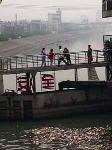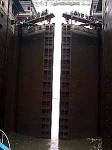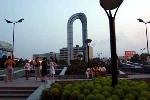- Getting around Lijiang. Dont stay in the Old Towns more than 2 days, there is nothing to do. KRISS Oct 9, 2013 05:46
- 2013 Beijing Temple Fair BENNYLAU Feb 26, 2013 03:29
- Malaysian traveling from KUL - LAX vis Shanghai PVG ZATI_DY Jan 3, 2013 20:15
The River - Part Three - The Yichang Dam
- Views: 4474
- |Vote: 1 0
- |Add to Favorites
- |Recommend to Friends
A Little Advice
The best advice that any traveller can ever follow is this: travel slowly. You notice more when you're not in a rush to keep to a schedule. The thing that most spoils one's appreciation of a splendid temple or a grand mountain peak is the pressing need to be at another one before the gates close.
Travel, however, is rarely slow. Without the luxury of a fabulous travel budget, most travellers try to pack in as many destinations as possible with the limited resources and time off from work available. the result is that it's rarely as satisfying as the travel brochures promise, that moment of self-discovery on the clifftop is only given ten minutes before it's back on the bus and on to the next souvenir shop. With all the luggage, meals and accommodation to sort out, most travellers perhaps forget the reasons why they've set out in the first place. Those reasons might be different for different people, but the one consistent theme amongst them is the assumption that being in a different place will have a profound effect on you: and the assumption is correct, but only as correct as is the assumption that by taking a language class you'll learn a language. One thing that being a student of Chinese has brought home for me is that the level of ability and understanding you can achieve directly depends upon the enthusiasm and enjoyment you experience whilst actively reaching for it. Travel is the same: the scenery and local people drift past the bus unimpressively unless you're glued to the window like a child.
Into the Locks
Lao Hei and I, coming to the end of our journey along the Yangtze river as it flowed across the central Chinese province of Hubei, were perfect examples of how not to travel. It was whilst we were standing out on deck going over a vocabulary lesson we'd shoved in our satchels for practice that we realised that our rough itinerary was just slightly longer than the amount of time we had available, and that if we were going to catch the train in time for Lao Hei's lesson on Monday morning we'd have to *burn* a little faster.
The boat was due to arrive in Yichang city, home of the Three Gorges Dam, within the hour, and we needed to see as much as we could see and be out of the place by sundown if we were going to get to our next stop, Hubei's capital city of Wuhan, in good enough time to, well, get out of Wuhan and be off once again. The mistake in our thinking was that we'd have to get through everything as quickly as possible to be in as many places as possible, when in retrospect a better plan would have just been to skip a city or two. This is the classic error of travellers - the idea that merely being there means anything significant at all. A tourist might be able to brag at having visited a hundred cities, but the truth of the matter is that I have met more interesting and successful travellers who've spent a year in just one small town. Travel is at best when it is done slowly.
Before long, the river locks above Yichang and the Three Gorges Dam were in sight. The locks are a feature of the completed section of the dam which holds the river above Yichang several metres higher than the calmer river waters flowing past the city. The passengers rushed out of their dormitory cabins as the ferryboat positioned itself into the lock, facing the massive iron gate holding back the water. At the same time, we noticed that the crowds standing on the locks themselves began to swell with tourists, fascinated by the machinery which, every several minutes or so, lifts or drops the enormous rivercraft to the new river level. We shyly stared into camcorders pointed at our slowly descending vessel. The lock slowly drained the water, leaving our ship at the bottom of a huge well of steel, pungent with river silt and rust. Then, with the pomp of parting theatre curtains, the great gates opened out onto the Yangtze river at Yichang, and to the spectacle of the part-constructed largest dam in the world.
We sailed quietly past the dam, source of one of China's greatest controversies on the world stage. Rows of tall, birdlike cranes lifting masses of concrete and metal bowed humbly before the ferry, like priests genuflecting at the altar.
Yichang City
In any foreign country, native people will ignore you if your travelling companion speaks their language better than you do. Lao Hei and I managed to communicate in Chinese quite adequately whilst travelling together, but with the temporary addition of Tim, Beijing University student from England, every sentence we spoke to any Chinese person resulted in a glance towards him for confirmation. Tim has a tall, slender frame, and therefore towered above Lao Hei and I in height as well as linguistic ability; we followed him off the boat at Yichang like novices clutching our satchels stuffed with sweaty T-shirts and my enormous old digital camera. Tim, in his orange coat and brightly-coloured beanie, looked like a character straight out of Dr Seuss, gangly, hairy legs extending out from knee-length shorts, casually dropping phrases of fluent Chinese at gaping onlookers, perhaps to dispel the illusion of the unbreachable gulf endemic to Sino-foreign relations.
Yichang is a bright and well-developed city on the Yangtze. Colourful apartment blocks were a welcome substitute for the ugly, bathroom-tiled monoliths common to the area, and as we ascended the sloping paths up from the quay, we had the sense of entering a reserve of freshness not previously seen in our voyage down the river. We navigated a simple map in search of the long-distance bus station, given that our first priority in Yichang was to arrange to leave it, allowing as much time as possible to get to know the city before the necessity of departure.
At the roadside along the way, Tim spotted a merchant of a favourite spiked kebab snack and made an enthusiastic order, urging us to try them. The elderly lady in her jersey huffed at the river air, chuckling to herself at the curious experience of speaking to foreigners in Chinese. Instead of communicating in complete sentences, she elected to mutter short answers into the wind and then incant to herself, "very good Chinese, very good Chinese".
We parted with Tim at the bus station, deciding instead to try to find a train to ride out in the morning, which according to our information should have been faster than the bus. The train station was a little further through the city, nicely tree-lined broad streets leading to a commercial centre which, although a little grey in the half-light under the cloud, was spacious and busy. An enormous set of stairs led up the side of a steep hill on the top of which the train station sat like a temple. The task of climbing the stairs similarly demanded the persistence of a devotee. Any resemblance to a religious structure ended at the door, however; the interior was a mere dusty hall with booths and a destinations board.
We were headed for Wuhan, and it took a while for us to figure out why we couldn't find it on the board. When your command of Chinese characters isn't very good, you have to remember basic forms and then constantly check back and forth to find a match - we were checking for the characters for Wuhan and it took us a full 20 minutes to confirm that it wasn't there. It was only when we rechecked our guidebook that we remembered that Wuhan city is composed of three separate city centres facing each other across the river, Hankou, Hanyang, and Wuchang, and that the rail stations are listed according to those names and not the all-encompassing 'Wuhan'. This was possibly the first time the guidebook would have been truly useful on the journey, except that once we had figured out when the trains would be leaving for Wuhan, we saw that there were none that would get us there in time. There was nothing for it but to fume on the stairs for a while and then head back to the bus station.
We walked the way back, passing an outdoor mall promotion, the stage erected in front of the great glass doors and several announcers and dancers overenthusiastically commanding the attention of an unreasonably large crowd. It was already past noon, and we were still completely unaware of what there was to see in Yichang, let alone what we stood to miss as our time there grew increasingly shorter.
A long queue at the bus station later, we were faced with the only option - a bus to Wuhan that would be leaving in fifteen minutes and arrive at around ten that evening. Before we knew it we were standing in the parking lot taking our last glimpses of a city that had made a positive impression on us without trying. The mood of the moment, however, was beginning to revert back to the rattiness of being lost in Chengdu. It was at about this point on the journey that Hamish and I gave up trying to be explorers, gave up the romantic pretence of discovery-travel, and gave up trying to photograph anything more spectacular than beautiful women.
As the bus pulled away, we saw Tim wandering around the ticket booths, evidently as unsuccessful in securing good tickets as we had been. The bus hurtled through the inner city and past the only monument we were to get to see in Yichang, a simple three-pillared arch.






 Copyright © 1998-2026 All rights reserved.
Copyright © 1998-2026 All rights reserved.